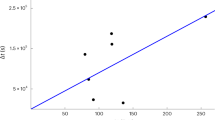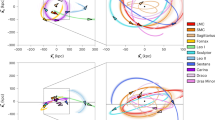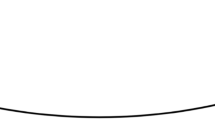Abstract
If the Universe can rotate, why does it rotate so slowly? We formulate this ‘rotation problem’ by introducing a dimensionless measure of the angular velocity in the early Universe which must have been <5 × 10−28 in order to be compatible with present-day upper limits on the rotation. Hitherto the slow rate of rotation has been explained only by invoking Mach's principle, which decrees that it vanish. Here we point out that an inflationary epoch in the very early Universe, proposed as a solution to other cosmological problems, could also solve the ‘rotation problem’, and thus make the Mach principle redundant.
This is a preview of subscription content, access via your institution
Access options
Subscribe to this journal
Receive 51 print issues and online access
$199.00 per year
only $3.90 per issue
Buy this article
- Purchase on Springer Link
- Instant access to full article PDF
Prices may be subject to local taxes which are calculated during checkout
Similar content being viewed by others
References
Guth, A. H. Phys. Rev. D 23, 347 (1981).
Barrow, J. D. Mon. Not. R. astr. Soc. 175, 359 (1976).
Hawking, S. W. Mon. Not. R. astr. Soc. 142, 129 (1969).
Birch, P. Nature 298, 451 (1982).
Ellis, G. F. R. Cargèse Lectures in Physics Vol. 6 (ed. Schatzman, E.) 1 (Gordon and Breach, New York, 1973).
Tammann, G. A., Sandage, A. & Yahil, A. Physical Cosmology (eds Balian R., Audouze, J. & Schramm, D. N.) 53 (North-Holland, Amsterdam, 1980).
Olive, K. A., Schramm, D. N., Steigman, G., Turner, M. S. & Yang, J. Astrophys. J. 246, 557 (1981).
Collins, C. B. & Hawking, S. W. Mon. Not. R. astr. Soc. 162, 307 (1973).
Barrow, J. D. Mon. Not. R. astr. Soc. 178, 62 (1977).
Weinberg, S. Gravitation and Cosmology (Wiley, New York, 1972).
Misner, C. W. Nature 214, 40 (1967); Astrophys. J. 151, 431 (1968).
Ellis, J., Gaillard, M. K. & Nanopoulos, D. V. Phys. Lett. 90 B, 253 (1980).
Sato, H. Prog. theor. Phys. 63, 1971 (1980).
Mach, E. The Science of Mechanics (transl. McCormack, T. J.) 6th edn (Open Court, La Salle, Illinois, 1960).
Sakharov, A. D. Zh. eksp. teor. Fiz. Pis'ma Red. 5, 32 (1967).
Steigman, G. Unification of the Fundamental Particle Interactions II, (eds Ellis, J. & Ferrara, S.) 263 (Plenum, New York, 1982).
Ellis, J., Nanopoulos, D. V., Olive, K. A. & Tamvakis, K. Preprint CERN TH.3404 (1982).
Barrow, J. D. & Turner, M. S. Nature 292, 35 (1981).
Hawking, S. W. & Moss, I. Phys. Lett. 110B, 35 (1982).
Author information
Authors and Affiliations
Rights and permissions
About this article
Cite this article
Ellis, J., Olive, K. Inflation can solve the rotation problem. Nature 303, 679–681 (1983). https://doi.org/10.1038/303679a0
Received:
Accepted:
Published:
Issue Date:
DOI: https://doi.org/10.1038/303679a0
This article is cited by
-
The rotation problem
General Relativity and Gravitation (2020)
-
An inflationary bianchi V model with shear and rotation
General Relativity and Gravitation (1994)
-
Rotating cosmological models of Bianchi type VIII
Soviet Physics Journal (1989)
-
Rotating models of the early universe
Soviet Physics Journal (1989)
-
Rotation in cosmology
Soviet Physics Journal (1988)
Comments
By submitting a comment you agree to abide by our Terms and Community Guidelines. If you find something abusive or that does not comply with our terms or guidelines please flag it as inappropriate.



